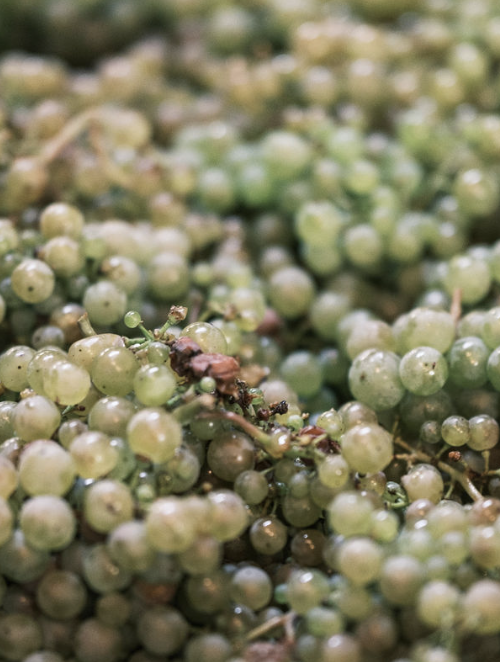
Dry Saar wines – expressive wines with a low alcohol content!
Dry Saar wines are now among the finest dry white wines in the world! But that wasn't always the case: Until 20 years ago, the steep vineyards of the Saar mainly produced fruit-sweet wines.
Since the younger generation took over the estates about 15 years ago, the excellently trained and widely travelled young winemakers have used their know-how to produce not only the classic semi-sweet wines in the cool climate of the Saar, but also outstanding dry Saar Rieslings and Burgunds. These wonderfully fresh and easy-drinking wines impress with their fine fruit aromas, pronounced minerality and low alcohol content. Basically, there are three types of dry Saar wines: dry quality wines (enriching the fermenting must with sugar is permitted), dry predicate wines (enrichment is not permitted), and the so-called VDP.GROSSE GEWÄCHSE (quality wines from VDP.ERSTEN LAGEN).
Order the dry Saar wines from our top winemakers at winemaker prices from us below.
Dry Saar wines – expressive wines with a low alcohol content!
Dry Saar wines are now among the finest dry white wines in the world! But that wasn't always the case: Until 20 years ago, the steep vineyards of the Saar mainly produced fruit-sweet wines.
Since the younger generation took over the estates about 15 years ago, the excellently trained and widely travelled young winemakers have used their know-how to produce not only the classic semi-sweet wines in the cool climate of the Saar, but also outstanding dry Saar Rieslings and Burgunds. These wonderfully fresh and easy-drinking wines impress with their fine fruit aromas, pronounced minerality and low alcohol content. Basically, there are three types of dry Saar wines: dry quality wines (enriching the fermenting must with sugar is permitted), dry predicate wines (enrichment is not permitted), and the so-called VDP.GROSSE GEWÄCHSE (quality wines from VDP.ERSTEN LAGEN).
Order the dry Saar wines from our top winemakers at winemaker prices from us below.
last seen
1.
Diverse flavors: Dry wine can offer a wide range of flavor profiles, from fruity and floral to mineral and spicy. This variety allows wine drinkers to select the perfect wine depending on their preferences and the occasion.
4.
Lower sugar content: For those who prefer a wine with a lower sugar content, dry wine is the ideal choice. The low sweetness makes the wine easy to drink without being overly sweet.
5.
Wine tradition: Many renowned wine regions, especially in Europe, have a long tradition in the production of dry wines. This tradition and expertise are reflected in the quality and reputation of dry wines.
The popularity of dry wine extends across various grape varieties and wine regions, and wine lovers appreciate the versatility of this flavor profile for different occasions and taste preferences.
1. Grape Variety: The grape variety significantly influences the shelf life. Some varieties, such as Cabernet Sauvignon or Riesling, age well and gain complexity. Other grape varieties, such as Elbling or Müller-Thurgau, are generally not considered to have a very high aging potential and should be drunk young – exceptions prove the rule.
2. Wine Quality: High-quality, well-made wines tend to age better. They are often better balanced and can gain depth and nuance over time.
3. Storage conditions: The way wine is stored plays a crucial role. Ideal storage conditions include a cool, dark place with a constant temperature and humidity. Corked wine bottles should be stored horizontally to keep the cork moist and prevent oxidation.
4. Producer: Whether red wine, white wine or rosé – the producer plays a crucial role in the shelf life of wine. There are producers, such as Egon Müller, who are known for their wines' ability to age well over years and decades, while other wineries produce wines intended for immediate consumption.
5. Vintage: Some vintages are better suited for aging than others. In years with good growing conditions and harvests, the wines can last longer and achieve higher quality.
Overall, a well-aged dry wine, stored under suitable conditions, can last for several years, even decades. However, it's important to note that not all wines are suitable for long-term storage, and some are best enjoyed within the first few years after release.
1. Social gatherings:
Dry wine is a popular choice for social occasions, whether it's dinner with friends, family celebrations, or parties. It pairs well with a variety of foods and flavors, making it a versatile option for shared meals.
2. Fine Dining:
Dry wine is often preferred in upscale restaurants and for festive occasions. Its versatility allows it to be paired with a wide range of dishes, from seafood to meat dishes.
3. Pure wine enjoyment:
A glass of dry wine can be enjoyed on its own. Whether after a long day or simply for relaxation, dry wine offers a wide range of aromas and flavors that delight the palate.
4. Wine tastings:
Dry wines are ideally suited for wine tastings and tasting events. Their complexity allows for the exploration of the different nuances and characteristics of various grape varieties and vintages.
5. Summery refreshment:
A cool glass of dry white wine or rosé is a refreshing choice on warm days. The lively acidity and fruity notes make it a popular summer companion.
The versatility of dry wine allows it to be enjoyed on almost any occasion. The right choice often depends on personal preferences and the accompanying food.
 Delivery time 2-3 working days
Delivery time 2-3 working days Saar wines at winemaker prices
Saar wines at winemaker prices Largest Saar wine range on the web
Largest Saar wine range on the web Advice: 0176 638 92254
Advice: 0176 638 92254





















